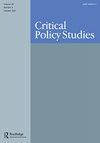Practicing deliberative policy analysis: two cases from China and Europe
IF 2.4
3区 社会学
Q1 Social Sciences
引用次数: 0
Abstract
ABSTRACTDeliberative policy analysis (DPA) has fallen short and has been far from reaching its potentials as an alternative to traditional policy analysis. As a response, DPA has been reframed toward a methodological orientation. This article is a follow-up to the two special issues on DPA in 2019 and 2020. It begins by outlining the methodological framework of DPA, introducing its key considerations, the process, and the proposed organizational solution. Two DPA cases, conducted in China and Europe, are presented to showcase how the framework has been used in practice, and in authoritarian and democratic context, respectively. Then, the article brings up our discussions of and reflections on the two cases from a comparative perspective, regarding their different political contexts, foci on conflicts of interests or values/worldviews, and the design of the processes. We end the article by proposing some topics for further exploration.KEYWORDS: Deliberative policy analysismethodological frameworkdeliberationconsensus buildingpractical cases AcknowledgmentsThe authors would like to thank Hendrik Wagenaar and two anonymous reviewers for their insightful comments on this article. The authors also appreciate the contribution and collaboration of the EAD team and the advisors of the Volt Europa deliberation project.Disclosure statementNo potential conflict of interest was reported by the author(s).Notes1. A widely referenced definition of public policy is ‘whatever governments choose to do or not to do’ (Dye Citation2016, 1). Here we can understand ‘policy’ in a broader way: policy refers to public decision made by governments, communities, other public organizations, or international actors within their jurisdiction. It could be in forms of law, regulation, decree, plan or program, public rules or notice, guidelines or vision, organizational charter or constitution, international treaty or agreement, etc. DPA can be widely applied to these situations.2. In China, public participation is mandatory in three major institutional scenarios, public price hearing (Yang and Schachter Citation2003), administrative rule-making (Horsley Citation2018), and environmental impact assessment (Enserink and Alberton Citation2016).Additional informationNotes on contributorsYa LiYa Li is a professor of Public Administration at Beihang University, China, He also serves as the founding director of the Laboratory for Deliberative Policy Analysis (LDPA). His research focuses on deliberative policy analysis, public deliberation, and public dispute resolution. He proposed the methodological orientation of DPA and has accordingly conducted more than a dozen purposeful practice in Beijing. His recent books include Deliberative Policy Analysis (China Social Sciences Press 2022) and Resolving Public Disputes Creatively (Renmin 2015).Lukas SaleckerLukas Salecker is a political economist based in Berlin, Germany. He has actively engaged as a consultant, organizer, and leader in initiatives empowering citizens, challenging the status quo, and shaping a collective future for the common good. In 2021, he co-organized a participatory process based on the citizen assembly model within Volt Europa, piloting the practice of Deliberative Policy Analysis in a Western context. Recently, he initiated the deliberAIde project, harnessing AI to enhance deliberative decision-making for inclusive, consensual, and sustainable democratic participation.实行协商性政策分析:中欧两个案例
摘要协商性政策分析(deliberative policy analysis, DPA)作为传统政策分析的替代手段,其潜力还远远没有发挥出来。作为一种反应,发展业务分析会已朝着方法论方向重新调整。本文是DPA 2019年和2020年两期特刊的后续。本文首先概述了DPA的方法学框架,介绍了DPA的关键考虑因素、流程和建议的组织解决方案。在中国和欧洲进行的两个DPA案例分别展示了该框架如何在实践中以及在专制和民主背景下使用。然后,本文从比较的角度对这两个案例进行了讨论和思考,包括它们不同的政治背景、关注的利益冲突或价值观/世界观,以及流程的设计。最后,我们提出了一些有待进一步探讨的主题。作者要感谢Hendrik Wagenaar和两位匿名审稿人对本文的深刻评论。作者还感谢EAD团队和Volt Europa审议项目顾问的贡献和合作。披露声明作者未报告潜在的利益冲突。一个被广泛引用的公共政策定义是“政府选择做或不做的任何事情”(Dye Citation2016, 1)。在这里,我们可以从更广泛的角度理解“政策”:政策是指政府、社区、其他公共组织或国际行为体在其管辖范围内做出的公共决策。它可以是法律、法规、法令、计划或项目、公共规则或通知、指导方针或愿景、组织章程或宪法、国际条约或协议等形式。DPA可以广泛应用于这些情况。在中国,公众参与在公共价格听证会(Yang and Schachter Citation2003)、行政规则制定(Horsley Citation2018)和环境影响评价(Enserink and Alberton Citation2016)这三种主要制度情景中是强制性的。作者简介李亚,中国北京航空航天大学公共管理学院教授,同时也是审议性政策分析实验室(LDPA)的创始主任。他的研究重点是审议性政策分析、公共审议和公共争端解决。他提出了DPA的方法论取向,并据此在北京进行了十多次有目的的实践。最近出版的著作包括《审慎的政策分析》(中国社会科学出版社2022)和《创造性地解决公共纠纷》(人民出版社2015)。Lukas Salecker是德国柏林的政治经济学家。他作为顾问、组织者和领导者积极参与赋予公民权力、挑战现状和为共同利益塑造集体未来的倡议。2021年,他在伏特欧罗巴参与组织了一个基于公民集会模式的参与式过程,在西方背景下试点审议性政策分析的实践。最近,他发起了审议项目,利用人工智能来加强审议决策,以实现包容性、共识性和可持续的民主参与。
本文章由计算机程序翻译,如有差异,请以英文原文为准。
求助全文
约1分钟内获得全文
求助全文

 求助内容:
求助内容: 应助结果提醒方式:
应助结果提醒方式:


